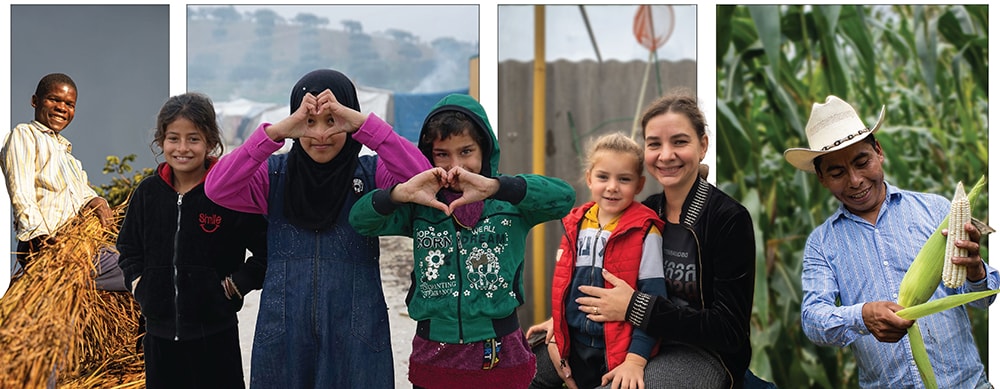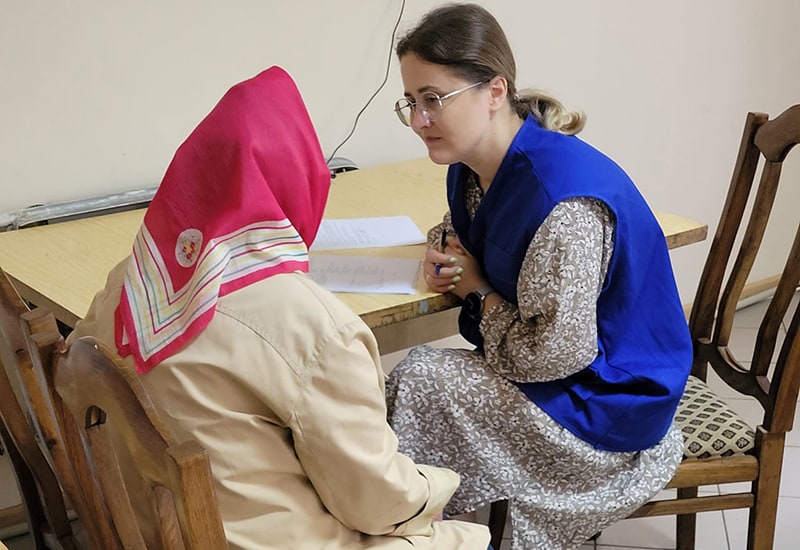World Humanitarian Day

Image credit: UNOCHA
August 19 is World Humanitarian Day – an opportunity to recognize the contributions and sacrifices made by humanitarian workers around the world, including CDC responders.
The UN Refugee Agency estimates that nearly 108 million people were forcibly displaced worldwide in 2022 due to persecution, conflict, violence, human rights violations, and events seriously disturbing public order.
When disaster strikes, CDC’s global health experts work with partners around the world to assist populations impacted by crises and strengthen public health globally. This work happens before, during, and after humanitarian emergencies. CDC provides public health expertise and uses evidence-based approaches to guide response efforts. Learn more about why CDC’s emergency response and recovery work is important.
On this World Humanitarian Day, read examples of how CDC provides expertise in global humanitarian crises around the world:
War in Ukraine
After a year and a half, Russia’s war in Ukraine displaced approximately 20% of Ukraine’s population across Europe. The resulting humanitarian crisis triggered significant information gaps on healthcare needs across Ukraine, particularly among refugee populations.
At the start of the war, CDC experts activated a program level incident management structure (IMS) with the CDC Ukraine Country and Eastern Europe and Central Asia Regional offices to respond to the Ukraine regional crisis. To date, CDC experts have worked to conduct assessments and surveys, establish monitoring systems, and provide training on epidemiology in emergencies, risk communication and community engagement, mental health and psychosocial support, rapid response teams, and water, sanitation, and hygiene (WASH). CDC has worked with field epidemiology trainees from Georgia, Moldova, Ukraine, Armenia, and Azerbaijan to help inform and guide actions to improve health and healthcare access among Ukrainians living in Refugee Accommodation Centers in Moldova.

A Field Epidemiology Training Program (FETP) resident from Moldova interviews a Ukrainian refugee about access to healthcare and mental health to understand how to better provide health services to those living in Refugee Accommodation Centers.
CDC staff continue to provide critical technical assistance and training in nutrition and maternal and child health, as well as emergency surveillance, needs assessments, data analytics and reporting, risk communication and community engagement (RCCE), and risk reduction of waterborne illnesses.
Greater Horn of Africa Crisis
People in the greater Horn of Africa are facing the worst drought in 40 years. More than 30 million people face severe food insecurity stemming from conflict, climatic shocks, economic impacts of COVID-19, and the rising cost of food. The crisis is further complicated by outbreaks of infectious diseases, high rates of acute malnutrition, displacement, limited or reduced access to populations, limited access to health care, and severely underfunded response.
CDC uses lessons learned from previous programmatic and famine response experience to provide critical cross-cutting technical assistance to CDC country offices and global partners such as the United Nations Children’s Fund (UNICEF), World Health Organization (WHO), and United Nations (UN) Refugee Agency. In Ethiopia, CDC is working closely with partners to develop data driven models that can assist in prioritizing treatment for children most at risk of death from acute malnutrition.
Since 2020, CDC has also been working with the Cooperative for Assistance and Relief Everywhere (CARE) International in the Dadaab refugee complex in Kenya on a project to strengthen WASH services. Efforts include installing handwashing stations at healthcare facilities and schools, increasing households’ access to safe drinking water through the piped network in Dadaab camp, supporting hygiene promotion, distributing handwashing stations and soap to households, and monitoring and evaluating use of hygiene items.

CDC supported the construction of this handwashing station outside of a school in Dadaab refugee complex in Kenya.
Türkiye-Syria Earthquake
The health and humanitarian impact of 12 years of war in northwest Syria was already significant before the February 2023 earthquake devastated northwest Syria and Türkiye. Damaged infrastructure and continued aftershocks forced a new wave of internally displaced persons (IDPs).
Because of CDC’s longstanding support to the Assistance Coordination Unit (ACU) in Syria on Early Warning Alert and Response surveillance (EWAR), public health staff were able to quickly provide technical assistance to strengthen and maintain the EWAR system, a system that has been critical in identifying previous outbreaks. CDC plans to conduct a rapid evaluation of the EWAR system in collaboration with partners to assess functionality and adaptability of the system with a focus on detection and response to COVID-19, measles, and cholera.
Global cholera outbreaks/Ending Cholera
Since 2021, there has been an unprecedented surge in cholera outbreaks across Africa and Asia, representing a resurgence or new introduction of Vibrio cholerae in the affected countries. Overall, 30 countries are experiencing outbreaks of cholera. In Africa, Malawi saw its largest documented outbreak ever in 2022 and 2023, and the Malawi outbreak spread to Mozambique, Zambia, Zimbabwe, and South Africa. Haiti experienced a resurgence of cholera in the Americas after 3.5 years of not reporting a case. In the Eastern Mediterranean, Syria has faced a large outbreak, and Lebanon had its first outbreak in over 30 years.
Humanitarian crises often exacerbate the threat of infectious disease outbreaks such as cholera. Conflict, displacement, and poor access to safe drinking water, sanitation and hygiene may lead to increased spread of cholera and hamper control efforts.

Providing access to safe drinking water is a key intervention during cholera outbreaks. Photo: Andrea Martinsen/CDC in Malawi
CDC WASH experts supported responses to cholera outbreaks in Malawi, Mozambique, Zimbabwe, Kenya, Lebanon, and Haiti. CDC is also working with partners in Burkina Faso and Kenya to improve access to safe water, sanitation, and hygiene services for refugees and internally displaced persons (IDPs).